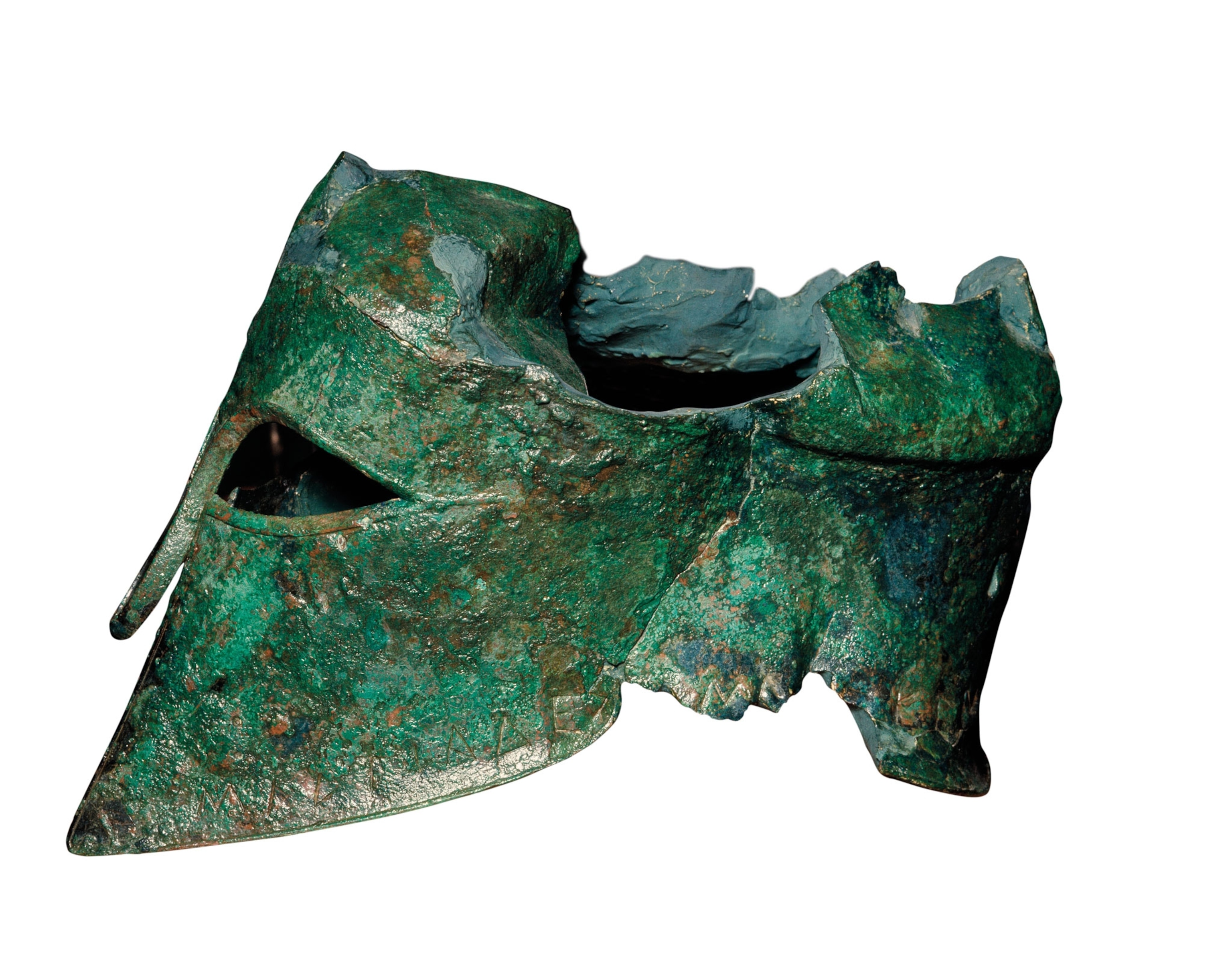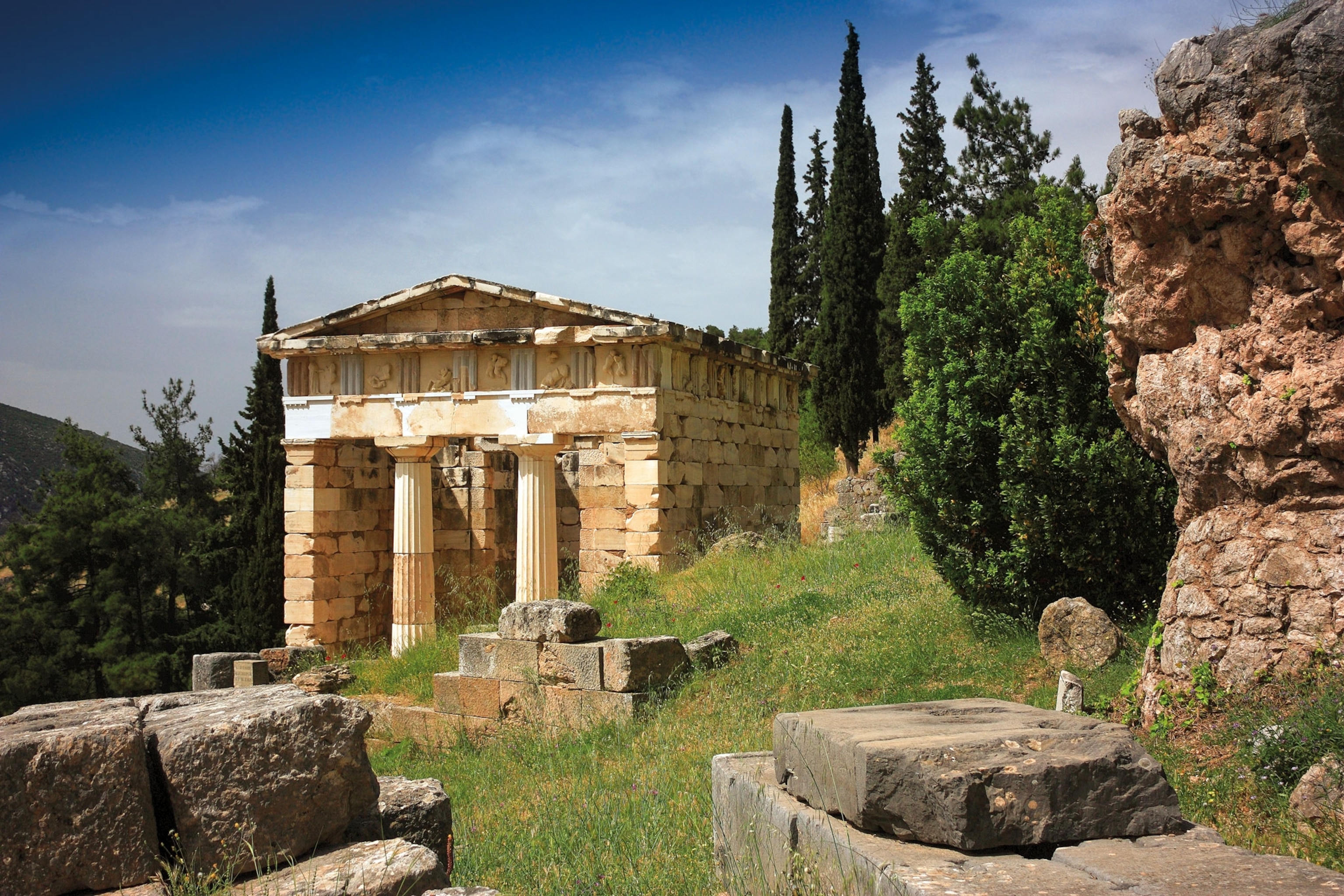At the Battle of Marathon, Athens' underdog victory stunned Persia
The surprise defeat of the mighty Persian Empire in 490 B.C. began the Golden Age of Athens and the Greco-Persian wars.

When dawn broke one summer morning in 490 B.C., Greek troops stood ready for battle on the coastal plain near Marathon, northeast of Athens. They awaited the charge of their mighty enemy: the powerful hosts of Persia, led by Darius the Great. His relentless expansion was headed westward, toward the heart of the ancient Greek world, a society he aimed to subjugate.
The Battle of Marathon marked a turning point in the wars between Greece and Persia. Prior to this defeat, the Persian Empire seemed unbeatable. Other leaders and other forces had fallen before its might, but the Battle of Marathon revealed that Persia, too, had weaknesses.

The victory became a bright, shining moment in the history of Athens. It inspired numerous legends and tales, including one in which the Athenian hero Theseus visits the battlefield to inspire the Greek forces to beat back their enemies. (Theseus faced off against the Minotaur in this famous myth.) Millennia later, the battle would even provide an origin story for a long-distance Olympic event: the marathon.
The first marathon

Messengers play a big part in the legends of Marathon, but they appear at different parts in the story. One account of a messenger first comes from Herodotus’s Histories, in which a runner, Pheidippides, is dispatched from Athens to Sparta to plead for reinforcements before the battle takes place. He successfully delivers his message in Sparta the next day, an astonishing feat, given that he would have had to run 155 miles. In the more familiar, modern version, a herald runs the 26 miles from Marathon to Athens to deliver news of victory. He arrives, exclaiming “Joy, we win!” before dying of exhaustion. This tale has its roots in the writings of later Greco-Roman authors such as Plutarch, and inspired the creation of the 26-mile race, known as a marathon following the revival of the Olympic Games in 1896. (Who has run the fastest marathon?)
Persian might
The buildup to Marathon began years before, and is chronicled by the fifth-century B.C. Greek historian Herodotus. He wrote about the battle some 30 years after it happened, and his text is one of the main sources on the event.

The mighty Persian Empire was led by Darius I, the third Persian king of the Achaemenid dynasty, who took power around 522 B.C. Persia reached its peak under Darius’s rule, as its lands sprawled from Turkey to the edge of India. Darius sought to control the Aegean and moved his forces to conquer parts of the Greek world—including Thrace, Macedonia, Ionia, and the Aegean Islands. (Under Cyrus the Great, Persia became the world's first superpower.)
By the end of the sixth century B.C., Athens grew alarmed by the westward extension of Persian influence. In 499 B.C. Ionian Greeks revolted against Persia, and Athens moved to support them. The Athenians sent ships and soldiers to aid the rebels and beat back the empire.
A Persian victory at the naval Battle of Lade in 494 crushed the Ionian rebellion, but Darius was infuriated by the Athenians’ insolence. He swore revenge. He also must have recognized that the city-state must be subdued in order to control the eastern Mediterranean.

In the summer of 490 B.C., Darius sent 600 ships carrying an army of some 25,000 men over the Aegean, under the command of Admiral Datis. After laying waste to islands and cities, Datis’s fleet made landfall on the long beach of Marathon in early September. For the Persians, this battle would have seemed a minor obstacle on their path to controlling the Aegean. For the Greeks, the stakes could not have been higher.
When the news reached Athens, an emergency assembly convened. Their decision was a difficult one. Leaving Athens to fight an army vastly superior in number was extremely dangerous. But waiting for the Persians to come to Athens was not a good option either, as the city’s defenses were weak. Sheltering and protecting the entire population of Attica, the region around Athens, would also be impossible.

After much debate, the assembly voted on a proposal put forward by Miltiades, the most charismatic of the 10 commanders leading the Athenian army. Convinced by Miltiades’ arguments, the Athenians mobilized and sent a messenger to the Spartans to ask for their aid, as Athens and Sparta had agreed to a mutual defense pact against the Persians. (Ancient Spartans were bred for battle.)
Armed and dangerous
As the envoy made his way to Sparta to deliver the plea for reinforcements, 10,000 hoplites marched to Marathon. The presence of allies from the central Greek city of Plataea brought the Greek numbers up to around 11,000. In addition to the Plataean battalion, the Greek hosts consisted of 10 battalions, one for each of the tribes or administrative divisions in Athens.
Each hoplite wielded an eight-foot spear made of ash, while his body armor consisted of a breastplate, helmet, and greaves, all made of bronze. The most important defensive item was a large wooden shield covered in bronze. The shield was positioned in such a way that almost half of it extended past the soldier’s left side and protected the hoplite standing next to him. This interlocking “wall” of shields protected the hoplite phalanx. The keys to its success were its cohesion and unity: While the wall remained closed, it was virtually impenetrable.

Among the Greek hoplites was 35-year-old Aeschylus, soon to become—along with Euripides and Sophocles—one of the three great tragedians of classical Athens. Aeschylus’s experiences in this and other battles would later inspire one of his most famous plays, The Persians. Aeschylus and his brothers-in-arms had cause for trepidation that morning: The Persians, comprising as many as 25,000 soldiers, outnumbered them considerably, and were backed up in the bay behind the battleground by their huge navy.
Among the things that the Greeks most feared were the Persian archers, famous for their skill and accuracy. Even though Greek hoplites were formidable in hand-to-hand combat, hails of Persian arrows had to be endured first. Their adversaries were also buoyed with confidence: Darius I’s army was formidable and had enjoyed a string of victories.
Ready for battle
For days, the two armies kept a wary eye on each other from a distance, engaging in nothing more than minor skirmishes. The Athenians were hesitant to march out onto the open plain, where the enemy horsemen could out-flank them and attack from the rear while the Persian archers shot at them from the front. For their part, the Persians did not dare attack the solid position taken up by the Greeks on the mountainside. The Persian leader Datis was mindful that the Spartan reinforcements would arrive soon to support the Athenians. He was losing time.
What Datis did next has puzzled historians: He sent his cavalry onto his boats and sailed them down the coast, presumably in a bid to try and take the undefended city of Athens. His withdrawal of such a vital component of his forces may also have been intended to lure the Athenians into battle with his infantry before the Greeks’ Spartan allies arrived.
Bronze vs. leather

Persian and Greek forces relied on different materials for defense. A Greek hoplite carried a large shield, called a hoplon (from which hoplites got their name), which was made of wood and coated with bronze. They also wore bronze greaves on their legs. Most donned Corinthian-style helmets, but some might have worn Attic helmets. The highly organized Persians used a large, light-weight shield made of reeds and leather, a straba, for protection. Some Persian soldiers wore padded linen breastplates, whereas others preferred cuirasses made of metal strips fixed to leather.
The Greeks convened a hurried war council at night. Some advocated returning to defend Athens, leaving thousands of enemies at their back. But Miltiades, whose turn it was to command that day, convinced the other nine generals that the best plan was to go out and fight on the plain even though the Spartans had not yet arrived. The Persians were known for their tactic of sending in their cavalry once their enemy had been weakened by repeated waves of arrows. With the cavalry off the scene, the Greeks believed they stood a much better chance of a hoplite-led victory.
On the run

On the morning of September 12, as the priests made sacrifices to the gods and the generals rallied the men in each tribe, the Greeks contemplated who they would be fighting. In the front line were the sparabara, who bore shields the size of doors made of reeds and leather. Behind them were rows of archers who could shoot volleys of arrows so fast that the second was whistling through the air before the first had landed. A Spartan would say years later that when the Persians fired their arrows, they blocked out the sun.
At last, the Athenian troops and their allies took up their shields and advanced. In his Histories, Herodotus vividly described their advance as seen by the incredulous Persians:
The space between the armies was not less than eight stades: and the Persians seeing them advancing to the attack at a run, made preparations to receive them; and in their minds they charged the Athenians with madness which must be fatal, seeing that they were few and yet were pressing forwards at a run, having neither cavalry nor archers.
Moment of victory

In Book VI of his Histories, Herodotus captured the moment of victory: The Athenians were drawn up for battle in the order which here follows: On the right flank, Callimachus was leader ... and after him came the tribes in order as they were numbered one after another ... Their army, once it had been deployed equal in length to that of the Persians they faced, had in the center but few ranks. And although [the Greek] army was weak here, each flank was nevertheless strengthened with numbers. And when they had been arranged in their places and the sacrifices proved favorable, then the Athenians set forth at a run to attack ... The Persians broke the ranks [of the center], but on both flanks the Athenians were winning the victory ... And they brought together their two flanks to attack those who had broken their center, and so the Athenians won the day.
“Eight stades” is roughly a mile. Herodotus’s implication that the Greeks covered all of this distance at a run has been contested by most modern historians, as the weight of their armor and weapons would have left them exhausted. It seems likelier they marched at a normal pace to the point where the Persian arrows could reach them when Miltiades gave the order to charge.
The hoplites’ speed minimized the amount of time they were exposed to the barrage of arrows. Such a charge could not have lasted for much more than 30 seconds. Once the dash was over, those hoplites who survived could fight hand to hand and press the advantage of better protection from their sturdier shields.

The hoplites in the front row were driven forward by those behind them and began to press into the enemy, cutting them down as they advanced. The Persians’ high-ranking officers were well armed, but the infantry around them began to fall.
Turning point

The center of the Greek lines bore the brunt of the Persian defense. Miltiades had chosen to thin out the ranks in order to extend the line, and so forestall any outflanking maneuvers. Consequently, the Greek troops were only four men deep instead of the usual eight. Overwhelmed, the Athenians in the center lines were unable to contain the enemy. The Persians broke through the center, but the Greek troops on both flanks wheeled inward and surrounded the enemy forces, who were then massacred.
In an attempt to escape from the carnage, the Persians began to break ranks and flee toward their ships, pursued by the Greeks who cut many down as they fled. Some hoplites got too far ahead and so lost the protection provided by their comrades. Among the Greeks who advanced too rapidly was Aeschylus’s own brother Cynaegirus, who threw himself onto an enemy ship. Herodotus records that “while taking hold there of the ornament at the stern of a ship, he had his hand cut off with an ax and fell; and many others also of the Athenians who were men of note were killed.”

When the fallen were counted, there were fewer than 200 Greek casualties, including one general. Persian losses totaled more than 6,000. Despite this resounding victory, the Athenians had only captured seven Persian ships; some of the Persian navy was already approaching Athens on the boats sent the day before. Datis had managed to get most of the rest of his fleet out of Marathon Bay in his bid to attack Athens from the western coast.
The exhausted Greek troops were marched overland back to the capital. The dash home paid off: Datis did not find the city defenseless, as he had hoped, but protected by the same army that had routed him hours earlier. Realizing it would be suicide to disembark, he gave his ships the order to raise anchor and retreat. Soon after the last Persian boat disappeared over the horizon, Spartan reinforcements arrived to discover it was all over.
Taking stock

At the battleground the Greeks buried their dead. Their sacrifice would become an important part of Athenian heritage: The memory of Marathon would rally Greek spirits when the Persian fleet returned a few years later to try, once again, to subdue Athens.
Historians have no substantial Persian sources to draw upon for the Battle of Marathon. One late classical writer quotes an anonymous Persian soldier, who claims the battle was an “unimportant failure.” This assessment was not wide of the mark. The Persian military had been rebuffed, not permanently expelled. Marathon was just the first of a series of harsh tests that the city of Athens had to face. In 480 B.C. the Athenians were forced to watch as Athens was put to the torch by Xerxes, Darius’s son.
Nevertheless, Marathon marked the first in a series of spectacular Greek victories in the Greco-Persian wars, culminating in the battles of Salamis in 480 B.C. and Plataea in 479, which finally ended the Persian threat. These events secured Athens militarily and inspired a cultural flowering as well. The victory at Marathon was not only documented in Herodotus’s Histories, but also in a wider outpouring of art, sculpture, and architecture. They inspired Aeschylus to write The Persians, his play set in the aftermath of the Persians’ final defeat.
So important was the memory of Marathon to Aeschylus that on his death in Sicily in 456 B.C., his epitaph makes no mention of the fact that he had been awarded the prize for the best tragic playwright in the Athenian festival, the Dionysia. It states, instead: “Beneath this stone lies Aeschylus . . . of his noble prowess the grove of Marathon can speak, and the long-haired Persian knows it well.”